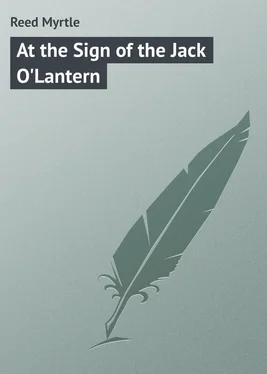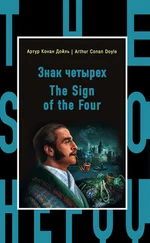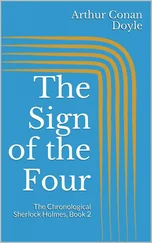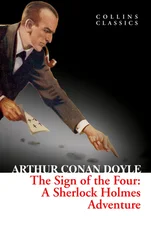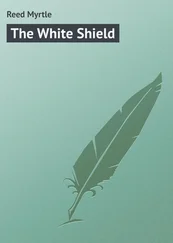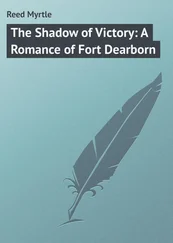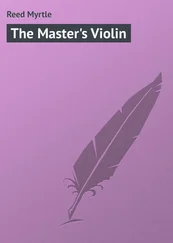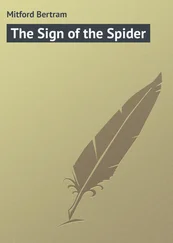Myrtle Reed - At the Sign of the Jack O'Lantern
Здесь есть возможность читать онлайн «Myrtle Reed - At the Sign of the Jack O'Lantern» — ознакомительный отрывок электронной книги совершенно бесплатно, а после прочтения отрывка купить полную версию. В некоторых случаях можно слушать аудио, скачать через торрент в формате fb2 и присутствует краткое содержание. Издательство: Иностранный паблик, Жанр: foreign_language, foreign_prose, foreign_humor, на английском языке. Описание произведения, (предисловие) а так же отзывы посетителей доступны на портале библиотеки ЛибКат.
- Название:At the Sign of the Jack O'Lantern
- Автор:
- Издательство:Иностранный паблик
- Жанр:
- Год:неизвестен
- ISBN:нет данных
- Рейтинг книги:5 / 5. Голосов: 1
-
Избранное:Добавить в избранное
- Отзывы:
-
Ваша оценка:
- 100
- 1
- 2
- 3
- 4
- 5
At the Sign of the Jack O'Lantern: краткое содержание, описание и аннотация
Предлагаем к чтению аннотацию, описание, краткое содержание или предисловие (зависит от того, что написал сам автор книги «At the Sign of the Jack O'Lantern»). Если вы не нашли необходимую информацию о книге — напишите в комментариях, мы постараемся отыскать её.
At the Sign of the Jack O'Lantern — читать онлайн ознакомительный отрывок
Ниже представлен текст книги, разбитый по страницам. Система сохранения места последней прочитанной страницы, позволяет с удобством читать онлайн бесплатно книгу «At the Sign of the Jack O'Lantern», без необходимости каждый раз заново искать на чём Вы остановились. Поставьте закладку, и сможете в любой момент перейти на страницу, на которой закончили чтение.
Интервал:
Закладка:
Harlan, most assuredly, was “thinkin’ ’bout sunthin’ else.” In fact, he was possessed by portentous uneasiness. There was well-defined doubt in his mind regarding his reception at the Jack-o’-Lantern. Dorothy’s parting words had been plain – almost to the point of rudeness, he reflected, unhappily, and he was not sure that “a brute” would be allowed in her presence again.
The bare, uncurtained windows gave no sign of human occupancy. Perhaps she had left him! Then his reason came to the rescue – there was no way for her to go but downhill, and he would certainly have seen her had she taken that path.
When he entered the yard, he smelled smoke, and ran wildly into the house. A hasty search through all the rooms revealed nothing – even Dorothy had disappeared. From the kitchen window, he saw her in the back yard, poking idly through a heap of smouldering rubbish with an old broomstick.
“What are you doing?” he demanded, breathlessly, before she knew he was near her.
Dorothy turned, disguising her sudden start by a toss of her head. “Oh,” she said, coolly, “it’s you, is it?”
Harlan bit his lips and his eyes laughed. “I say, Dorothy,” he began, awkwardly; “I was rather a beast, wasn’t I?”
“Of course,” she returned, in a small, unnatural voice, still poking through the ruins. “I told you so, didn’t I?”
“I didn’t believe you at the time,” Harlan went on, eager to make amends, “but I do now.”
“That’s good.” Mrs. Carr’s tone was not at all reassuring.
There was an awkward pause, then Harlan, putting aside his obstinate pride, said the simple sentence which men of all ages have found it hardest to say – perhaps because it is the sign of utter masculine abasement. “I’m sorry, dear, will you forgive me?”
In a moment, she was in his arms. “It was partly my fault,” she admitted, generously, from the depths of his coat collar. “I think there must be something in the atmosphere of the house. We never quarrelled before.”
“And we never will again,” answered Harlan, confidently. “What have you been burning?”
“It was a mattress,” whispered Dorothy, much ashamed. “I tried to get a bed out, but it was too heavy.”
“You funny, funny girl! How did you ever get a mattress out, all alone?”
“Dragged it to an upper window and dumped it,” she explained, blushing, “then came down and dragged it some more. Claudius Tiberius didn’t like to have me do it.”
“I don’t wonder,” laughed Harlan. “That is,” he added hastily, “he couldn’t have been pleased to see you doing it all by yourself. Anybody would love to see a mattress burn.”
“Shall we get some more? There are plenty.”
“Let’s not take all our pleasure at once,” he suggested, with rare tact. “One mattress a day – how’ll that do?”
“We’ll have it at night,” cried Dorothy, clapping her hands, “and when the mattresses are all gone, we’ll do the beds and bureaus and the haircloth furniture in the parlour. Oh, I do so love a bonfire!”
Harlan’s heart grew strangely tender, for it had been this underlying childishness in her that he had loved the most. She was stirring the ashes now, with as much real pleasure as though she were five instead of twenty-five.
As it happened, Harlan would have been saved a great deal of trouble if he had followed out her suggestion and burned all of the beds in the house except two or three, but the balance between foresight and retrospection has seldom been exact.
“Beast of a smudge you’re making,” he commented, choking.
“Get around to the other side, then. Why, Harlan, what’s that?”
“What’s what?”
She pointed to a small metal box in the midst of the ashes.
“Poem on Spring, probably, put into the corner-stone by the builder of the mattress.”
“Don’t be foolish,” she said, with assumed severity. “Get me a pail of water.”
With two sticks they lifted it into the water and waited, impatiently enough, until they were sure it was cool. Then Dorothy, asserting her right of discovery, opened it with trembling fingers.
“Why-ee!” she gasped.
Upon a bed of wet cotton lay a large brooch, made wholly of clustered diamonds, and a coral necklace, somewhat injured by the fire.
“Whose is it?” demanded Dorothy, when she recovered the faculty of speech.
“I should say,” returned Harlan, after due deliberation, “that it belonged to you.”
“After this,” she said, slowly, her eyes wide with wonder, “we’ll take everything apart before we burn it.”
Harlan was turning the brooch over in his hand and roughly estimating its value at two thousand dollars. “Here’s something on the back,” he said. “‘R. from E., March 12, 1865.’”
“Rebecca from Ebeneezer,” cried Dorothy. “Oh, Harlan, it’s ours! Don’t you remember the letter said: ‘my house and all its contents to my beloved nephew, James Harlan Carr’?”
“I remember,” said Harlan. But his conscience was uneasy, none the less.
III
The First Caller
As Mr. Blake had heard, there was “one hull room mighty nigh plum full o’ nothin’ but books”; a grievous waste, indeed, when one already “had a book.” It was the front room, opposite the parlour, and every door and window in it could be securely bolted from the inside. If any one desired unbroken privacy, it could be had in the library as nowhere else in the house.
The book-shelves were made of rough pine, unplaned, unpainted, and were scarcely a seemly setting for the treasure they bore. But in looking at the books, one perceived that their owner had been one who passed by the body in his eager search for the soul.
Here were no fine editions, no luxurious, costly volumes in full levant. Illuminated pages, rubricated headings, and fine illustrations were conspicuous by their absence. For the most part, the books were simply but serviceably bound in plain cloth covers. Many a paper-covered book had been bound by its purchaser in pasteboard, flimsy enough in quality, yet further strengthened by cloth at the back. Cheap, pirated editions were so many that Harlan wondered whether his uncle had not been wholly without conscience in the matter of book-buying.
Shelf after shelf stretched across the long wall, with its company of mute consolers whose master was no more. The fine flowering of the centuries, like a single precious drop of imperishable perfume, was hidden in this rude casket. The minds and hearts of the great, laid pitilessly bare, were here in this one room, shielded merely by pasteboard and cloth.
Far up in the mountains, amid snow-clad steeps and rock-bound fastnesses, one finds, perchance, a shell. It is so small a thing that it can be held in the hollow of the hand; so frail that a slight pressure of the finger will crush it to atoms, yet, held to the ear, it brings the surge and sweep of that vast, primeval ocean which, in the inconceivably remote past, covered the peak. And so, to the eye of the mind, the small brown book, with its hundred printed pages, brings back the whole story of the world.
A thin, piping voice, to which its fellows have paid no heed, after a time becomes silent, and, ceaselessly marching, the years pass on by. Yet that trembling old hand, quietly laid at last upon the turbulent heart, in the solitude of a garret has guided a pen, and the manuscript is left. Ragged, worn, blotted, spotted with candle drippings and endlessly interlined, why should these few sheets of paper be saved?
Because, as it happens, the only record of the period is there – a record so significant that fifty years can be reconstructed, as an entire language was brought to light by a triple inscription upon a single stone. Thrown like the shell upon Time’s ever-receding shore, it is, nevertheless, the means by which unborn thousands shall commune with him who wrote in his garret, see his whole life mirrored in his book, know his philosophy, and take home his truth. For by way of the printed page comes Immortality.
Читать дальшеИнтервал:
Закладка:
Похожие книги на «At the Sign of the Jack O'Lantern»
Представляем Вашему вниманию похожие книги на «At the Sign of the Jack O'Lantern» списком для выбора. Мы отобрали схожую по названию и смыслу литературу в надежде предоставить читателям больше вариантов отыскать новые, интересные, ещё непрочитанные произведения.
Обсуждение, отзывы о книге «At the Sign of the Jack O'Lantern» и просто собственные мнения читателей. Оставьте ваши комментарии, напишите, что Вы думаете о произведении, его смысле или главных героях. Укажите что конкретно понравилось, а что нет, и почему Вы так считаете.
